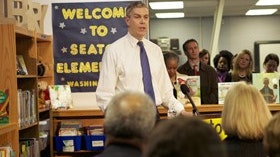Homepage
•
Learning Library
•
Blog
•
Secretary Duncan unveils Obama's ESEA reauthorization priorities
Expand breadcrumbs
Expand breadcrumbs
- Learning Library
- Blog
- Secretary Duncan unveils Obama's ESEA reauthorization priorities
- Homepage
- •
- Learning Library
- •
- Blog
- •
- Secretary Duncan unveils Obama's ESEA reauthorization priorities
Secretary Duncan unveils Obama's ESEA reauthorization priorities
By Hilary Goldmann
January 23, 2015








